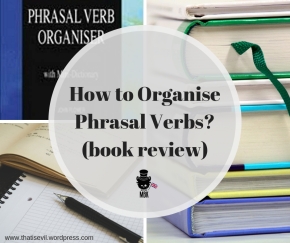
One of my most vivid memories from summer schools in England is the Arrival Day, when new students were picked up by young and happy people (usually 18-22 year old native speakers) from the airport and transported to school. Often it was an experience baffling for both parties – foreign kids couldn’t understand English teens and the latter couldn’t understand the fact someone didn’t get them. They thought they were perfectly understandable, but for those kids “alright, pick up your stuff and move along” was not the English they were used to.
Admit it, teaching phrasal verbs isn’t the most pleasant experience in the classroom. First of all, there are so many of them, they tend to be so illogical and a different preposition changes the whole meaning of the sentence. It makes learners believe the best way to deal with the wretched phrasal verbs is to avoid them, but we know that won’t do.
We need to be brave, though – we, the teachers, are meant to teach not only the adorable Present Perfect or crime-related vocabulary, but also the phrasal verbs. And if you – like yours truly – are not the greatest fan of those expressions that seem to be randomly mixed words with an extra weird meaning, I have a great solution for you!
Phrasal Verb Organiser is a great book written by John Flower who had apparently seen too many students suffering because of this ridiculous phrasal-verbish-conundrum… or maybe he had seen too many teachers struggling? Whatever inspired him to write the book brought us one of the most useful books ever.
Who is the book for?
Originally the book was designed for students, especially those who learn English on their own (“it is better to do a little at regular intervals, rather than a lot at one time, and then nothing for weeks”). However, I got myself a copy when I was a teacher and I found it a great help when teaching students on B2 level – it has helped me to provide the appropriate amount of phrasal verbs to help them move beyond the learning plateau.
How is it organised?
Surprisingly, you don’t start with the exercises – first you get started with the whole idea of a phrasal verb, with some sweet lies like “it is often possible to understand what a phrasal verb means by looking at its particles”.
As if I didn’t know that phrasal verbs are fragments of an ancient ritual of summoning demonic creatures from the deepest abyss of hell!
And then you may enjoy nine chapters titled e.g. verbs with down/up/off/out/two particles etc. Then you may enjoy common verbs (be, get, go etc.), phrasal verbs with nouns or adjectives and even phrasal verbs by topic (business, feelings, travel or even colloquial expressions). If you’re not sure about the meaning, the book provides a useful mini-dictionary.
How can I use it in the classroom?
Each chapter has the same organisation – you start with matching verbs and particles so that they can be used in sentences; there are also funny pictures illustrating some of the verbs. You can always check your answer with the answer key, so no worries! If you need a greater challenge, after each chapter there’s a summary where you need to use one phrasal verb matching a couple of sentences.
You can simply use it in the classroom once in a while, bringing in random chunks of phrasal verbs (“this week we’ll work on the verbs with up“).
Ideas for extra activities
But wait, there is more! If you want to create a real combo, you can use one of the ready-made tests (seriously, tests on phrasal verbs – that is evil!). You can also use the verbs in some classroom games (bingo?) or races. I found the topic-selected chapters really useful for my adult students, but I guess you might use the book in many creative ways (using a meme generator and making one meme per day with a phrasal verb sounds like a great idea for a competition!).
Recommendations
The book practises over 700 phrasal verbs with more than 1000 meanings. Truth be told, I don’t think I would be able to recall all of them, so I admit I still find it useful, not only for my students, but also for self-study. If your students are just a wee bit too formal, or if you feel your language skills are soon going to be used by the BBC – go for it!
And have a blast!
fine
That is good chance due to I want improve my skill in English language